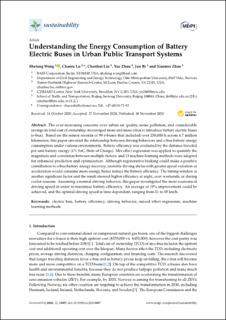Understanding the Energy Consumption of Battery Electric Buses in Urban Public Transport Systems
Peer reviewed, Journal article
Published version
Permanent lenke
https://hdl.handle.net/11250/2757980Utgivelsesdato
2020-11-30Metadata
Vis full innførselSamlinger
Sammendrag
The ever-increasing concerns over urban air quality, noise pollution, and considerable savings in total cost of ownership encouraged more and more cities to introduce battery electric buses (e-bus). Based on the sensor records of 99 e-buses that included over 250,000 h across 4.7 million kilometers, this paper unveiled the relationship between driving behaviors and e-bus battery energy consumption under various environments. Battery efficiency was evaluated by the distance traveled per unit battery energy (1% SoC, State of Charge). Mix effect regression was applied to quantify the magnitude and correlation between multiple factors; and 13 machine learning methods were adopted for enhanced prediction and optimization. Although regenerative braking could make a positive contribution to e-bus battery energy recovery, unstable driving styles with greater speed variation or acceleration would consume more energy, hence reduce the battery efficiency. The timing window is another significant factor and the result showed higher efficiency at night, over weekends, or during cooler seasons. Assuming a normal driving behavior, this paper investigated the most economical driving speed in order to maximize battery efficiency. An average of 19% improvement could be achieved, and the optimal driving speed is time-dependent, ranging from 11 to 18 km/h.

